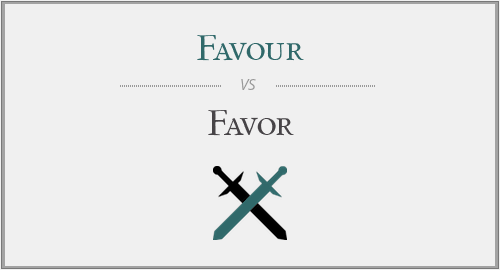Are “favour” and “favor” both correct, or is one word a misspelling of the other? These are two of the most confusing words in English, because they are both commonly used in the same contexts, with the same meaning, and many users aren’t sure whether they can correctly use both “favour” and “favor” according to their preference, or if there’s any rule to note.
We’ll make these things clear for you in just a minute, with the explanations you need to use “favour” and “favor” correctly with no worry or doubts regarding grammar, fluency or linguistic elegance.
“Favour” vs. “Favor”
Aren’t you sure about “favour” and “favor”? Well… do “favourite” and “favorite” or “flavour” and “flavor” sound familiar? All these pairs of words are representing the same situation: slight spelling variations created by different pronunciations and preferences between British English and American English.
More exactly, just like “favourite” and “flavour”, “favour” is the UK form for the US word “favor” (respectively “favorite” and “flavor”). Apart from this linguistic subtlety, “favour” and “favor” have the exact same meanings and function with the same roles and significations both as nouns and verbs.
When do we use “favour”?
“Favour” can be used both as a noun and as a verb, whenever you refer to something special done to help somebody or to the action of choosing or preferring one possibility. Even though you can use “favour” in any conditions with this meaning, it is definitely preferred, recommended and more elegant to use it in UK conversations only, or when addressing to a British audience, given the fact that this is the right spelling for them.
Example 1: Will you please make me a favour and talk to the manager for me? I really don’t have the time to discuss this matter myself. – “favour”, as a noun, refers to something done specially to help somebody.
Example 2: The psychologist is trying to observe whether the parents constantly favour one kid and neglect the other or not. – “favour”, as a verb, refers to the action of preferring or giving more importance to somebody.
When do we use “favor”?
“Favor” has the exact same definitions and uses as “favour”, but it’s recommended that you mostly use it in front of an American audience, or in a conversation that includes the US spellings of words, because this is how “favor” is actually defined in dictionaries and notorious English guides: the US spelling for “favour”. So, it will be a lot more elegant and appropriate if you keep this spelling for US English.
Example 1: Will you please make me a favor and talk to the manager for me? I really don’t have the time to discuss this matter myself. – “favor”, as a noun, refers to something done specially to help somebody.
Example 2: The psychologist is trying to observe whether the parents constantly favor one kid and neglect the other or not. – “favor”, as a verb, refers to the action of preferring or giving more importance to somebody.
Conclusion
Neither “favour”, nor “favor”, is wrong or misspelled. Both words are correct spellings of the same notion – but there is a difference you have to remember when using them: “favour” is preferred in British English, while “favor” is the US form of the same word. Apart from this, nothing can restrict the use of “favour” and “favor” and it’s your personal choice whether you wish to choose the shorter or the longer form.





Have a discussion about this article with the community:
Report Comment
We're doing our best to make sure our content is useful, accurate and safe.
If by any chance you spot an inappropriate comment while navigating through our website please use this form to let us know, and we'll take care of it shortly.
Attachment
You need to be logged in to favorite.
Log In